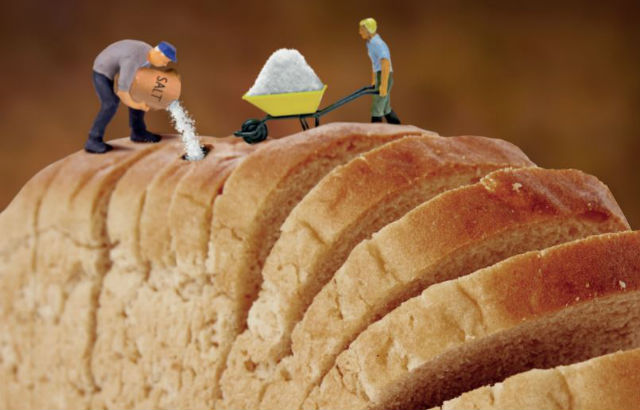
Action on Salt poster on the salt content of bread
To mark Salt Awareness Week (9th-15th March 2020), the group of experts are urging the Secretary of State for Health, Matt Hancock to implement more robust salt reduction targets - with proper enforcement - in order to create a fair and level playing field across both the retail and eating out sectors.
Data from a recent public opinion poll to accompany the survey highlights one of the main reasons why people consume plant-based food is that they are perceived to be healthier. However, this survey (the largest of its kind) of 290 plant-based and vegan meals collected from a total of 45 restaurant, takeaway, fast food and coffee chains, reveals the shocking truth about their salt and saturated fat content, and the dismal lack of nutritional information available. If food or drinks are high in saturated fat, salt or sugar (HFSS), they are not classified as 'healthy'.
Restaurant plant-based and vegan meals
A staggering three out of five plant-based restaurant meals surveyed with nutrition information (96/151) contain 3g or more salt - that's half of an adult's maximum daily intake of salt. Worse still, 19 of these provide 6g or more salt - that's an adult's entire maximum daily limit in just one meal.
Examples of salty meals
- Papa John's Vegan American Hot Medium Pizza, 9.28g salt - more salt than 7 McDonald's Hamburgers
- Loch Fyne Spiced Roasted Cauliflower & Squash Goan Curry 8.65g salt - saltier than 19 anchovies
- Bella Italia Vegan Cheese Pizza 8.1g salt - saltier than 23 bags of ready salted crisps
If these restaurant chains were to display colour-coded nutrition information on their menus like packaged food in supermarkets, more than four out of five (127/151) plant-based meals would have a red label for high salt content (i.e. >1.8g salt in a meal) .
Interestingly, the variation in salt content of similar meals served at different restaurants is surprising and shows that salt isn't needed for flavour - with some restaurants offering tasty dishes that have seven times less salt than their competitors, clearly demonstrating that these meals can easily be made with much less salt.
Fast food & coffee chains plant-based and vegan meals
A whopping two thirds of plant-based meals (82/128) available in fast food and coffee chains would get a red label for being high in salt (>1.8g salt per portion) - along with nearly two in five (29/128) meals containing 3g or more salt i.e. half of an adult's maximum daily intake of salt.
Examples of salty meals
- Wasabi Pumpkin Katsu Curry Yakisoba 10.3g salt - saltier than 8 McDonald's Hamburgers
- Wasabi Veg Tanmen Soup 9.7g salt -saltier than 21 anchovy fillets
- EAT 3 Bean, Smoked Chili and Tomato 5g salt - saltier than 14 bags of ready salted crisps
Saturated fat in plant-based and vegan meals
It's not just salty food being served up by UK restaurants, fast food and coffee chains - over half of all restaurant meals surveyed would qualify for a red label (>6g/portion) for saturated fat, and more than one in five dishes provide more than half of an adult's maximum daily intake for saturated fat. One of the worst offenders is Harvester's The Purist Burger (served with triple cooked chips), containing 54.2g saturated fat in a meal, nearly three times a woman's maximum daily intake.
Graham MacGregor, Professor of Cardiovascular Medicine at Queen Mary University of London and Chair of Action on Salt, said: "It is shocking that many in the 'out of home' sector appear to be deliberately ignoring the voluntary salt reduction targets, in what many regard incorrectly as healthy food. The government must enforce stricter and more comprehensive salt reduction targets and create a fair and level playing field wherever you choose to eat.
"Salt is the leading cause of raised blood pressure which in turn is the major cause of strokes and heart disease. According to the Department of Health & Social Care, each one gram/day reduction in population salt intake, saves more than 4,000 premature deaths per year. Given this, it is immoral of any food company not to do their part, and the Secretary of State needs to act now."
Salt Targets
The Government announced their commitment to reducing salt in their Prevention Green Paper last year, and are currently negotiating new targets for the food industry to achieve by 2023. The Secretary of State for Health Matt Hancock must now be brave and bring these out of home targets in line with the rest of the food industry, with clear consistent monitoring across the whole industry.
When asked if they would support government taking action to ensure that the out of home sector reduces salt levels in their dishes and is transparent about the nutritional content of their meals on menus, 73 per cent of the public said yes.






